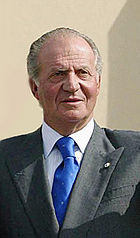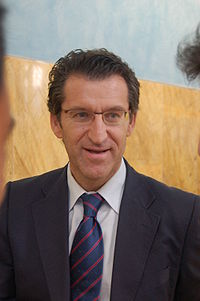
President of Galicia
Encyclopedia
Under the Galician Statute of Autonomy
, the President of the Xunta of Galicia
is the head of the government of the Spanish
autonomous community
of Galicia. Namely, he/she is the president of the executive
body of the Galician government, the Xunta de Galicia
.
As in other parliamentary democracies
the President is actually appointed by the Parliament
which is, on the other hand, directly voted in by the citizens.
The democratic period in Galicia starts in 1977 with the end of the Francoist dictatorship. Before that Galicia had last enjoyed self-government in the Middle Ages, in addition to a short period when the Xunta Suprema de Galicia was established during the Peninsular War
(1808-1813).
Technically speaking, the first two presidents up to 1981 were presidents of a non-autonomous Galicia, since the actual Statute of Autonomy was only passed in April 1981. Nonetheless, they played an important role in setting up the institution.
Galician Statute of Autonomy of 1981
The Galician Statute of Autonomy of 1981 is the current basic institutional norm of Galicia. The Galician Government, Parliament and High Court of Galicia are regulated by it.-Genesis of the 1981 Statute:...
, the President of the Xunta of Galicia
President of the Xunta of Galicia
The President of the Xunta of Galicia , usually known in English as the Galician regional president, is the head of government of Galicia. The president leads the executive branch of the regional government....
is the head of the government of the Spanish
Spain
Spain , officially the Kingdom of Spain languages]] under the European Charter for Regional or Minority Languages. In each of these, Spain's official name is as follows:;;;;;;), is a country and member state of the European Union located in southwestern Europe on the Iberian Peninsula...
autonomous community
Autonomous communities of Spain
An autonomous community In other languages of Spain:*Catalan/Valencian .*Galician .*Basque . The second article of the constitution recognizes the rights of "nationalities and regions" to self-government and declares the "indissoluble unity of the Spanish nation".Political power in Spain is...
of Galicia. Namely, he/she is the president of the executive
Executive (government)
Executive branch of Government is the part of government that has sole authority and responsibility for the daily administration of the state bureaucracy. The division of power into separate branches of government is central to the idea of the separation of powers.In many countries, the term...
body of the Galician government, the Xunta de Galicia
Xunta de Galicia
The Xunta de Galicia is the collective decision-making body of the government of the autonomous community of Galicia, composed of the President, the Vice-President and the specialized ministers ....
.
As in other parliamentary democracies
Parliamentary system
A parliamentary system is a system of government in which the ministers of the executive branch get their democratic legitimacy from the legislature and are accountable to that body, such that the executive and legislative branches are intertwined....
the President is actually appointed by the Parliament
Parliament of Galicia
The Galician Parliament is the unicameral legislature of the autonomous community of Galicia, Spain. It is formed by 75 deputies . Deputies are elected every four years in ordinary period, or extraordinarily upon dissolution and call of elections by the President of the Xunta of Galicia, by...
which is, on the other hand, directly voted in by the citizens.
The democratic period in Galicia starts in 1977 with the end of the Francoist dictatorship. Before that Galicia had last enjoyed self-government in the Middle Ages, in addition to a short period when the Xunta Suprema de Galicia was established during the Peninsular War
Peninsular War
The Peninsular War was a war between France and the allied powers of Spain, the United Kingdom, and Portugal for control of the Iberian Peninsula during the Napoleonic Wars. The war began when French and Spanish armies crossed Spain and invaded Portugal in 1807. Then, in 1808, France turned on its...
(1808-1813).
Technically speaking, the first two presidents up to 1981 were presidents of a non-autonomous Galicia, since the actual Statute of Autonomy was only passed in April 1981. Nonetheless, they played an important role in setting up the institution.
List of presidents
Parties| Portrait | President President of Galicia Under the Galician Statute of Autonomy, the President of the Xunta of Galicia is the head of the government of the Spanish autonomous community of Galicia... |
Took office | Left office | Party | Legislature (Election) |
Head of State | |
|---|---|---|---|---|---|---|---|
| Antonio Rosón Pérez (1911–1986) |
1977 | 1979 | UCD | Pre-autonomy |  King Juan Carlos I Juan Carlos I of Spain Juan Carlos I |Italy]]) is the reigning King of Spain.On 22 November 1975, two days after the death of General Francisco Franco, Juan Carlos was designated king according to the law of succession promulgated by Franco. Spain had no monarch for 38 years in 1969 when Franco named Juan Carlos as the... |
||
| José Quiroga Suárez (1920–2006) |
1979 | 1981 | |||||
| Xerardo Fernández Albor Xerardo Fernández Albor Xerardo Fernández Albor was president of the Spanish autonomous community of Galicia. He lost a motion of no confidence in 1987.-References:... (1917–) |
1981 | 27 September 1987 | APdeG Popular Alliance (Spain) The People's Alliance was a electoral coalition, and later a political party, founded in 1976 by Manuel Fraga along with six other former Francoist ministers.- History :... |
I (1981) |
|||
| II (1985) |
|||||||
| Fernando Ignacio González Laxe (1952–) |
27 September 1987 | 2 February 1990 | PSdeG-PSOE Socialist Party of Galicia The Socialist Party of Galicia is a centre-left political party in Galicia, Spain. It is the Galician affiliate of the Spanish Socialist Workers' Party . It defines itself as a Galicianist and social democratic party.-External links:Official*... |
||||
 |
Manuel Fraga Iribarne Manuel Fraga Iribarne Manuel Fraga Iribarne is a Spanish People's Party politician. Fraga's career as one of the key political figures in Spain straddles both General Francisco Franco's dictatorial regime and the subsequent transition to democracy. He served as the President of the Xunta of Galicia from 1990 to 2005... (1922–) |
2 February 1990 | 17 April 2005 | PPdeG People's Party of Galicia The People's Party of Galicia is a centre-right political party in Galicia, Spain. It is the Galician affiliate of the Spanish People's Party.... |
III (1989) |
||
| IV (1993) |
|||||||
| V (1997 Galician parliamentary election, 1997 The Galician parliamentary election of 1997 was held on Sunday, 19 October 1997 to elect members to the Parliament of Galicia.... ) |
|||||||
| VI (2001 Galician parliamentary election, 2001 The Galician parliamentary election of 2001 was held on Sunday, 21 October 2001 to elect members to the Parliament of Galicia.... ) |
|||||||
 |
Emilio Pérez Touriño Emilio Pérez Touriño Emilio Pérez Touriño is a Spanish politician and economist. He is the former secretary general of the Socialist Party of Galicia and, from August 2005 to March 2009, former president of the autonomous community of Galicia . Namely, he was president of the executive branch, the Xunta de Galicia... (1948–) |
17 April 2005 | 16 April 2009 | PSdeG-PSOE Socialist Party of Galicia The Socialist Party of Galicia is a centre-left political party in Galicia, Spain. It is the Galician affiliate of the Spanish Socialist Workers' Party . It defines itself as a Galicianist and social democratic party.-External links:Official*... |
VII (2005 Galician parliamentary election, 2005 Parliamentary elections were held in Galicia on 19 June 2005 to elect members to the Parliament of Galicia. The People's Party lost their absolute majority, and the Socialist Party of Galicia formed a coalition with the Galician Nationalist Bloc to take control of La Xunta.... ) |
||
 |
Alberto Núñez Feijóo Alberto Núñez Feijóo Alberto Núñez Feijóo is the 5th and current President of the Xunta of Galicia.Núñez Feijóo became president in April 2009 following the regional parliamentary elections held in Galicia the previous month.... (1961–) |
16 April 2009 | present | PPdeG People's Party of Galicia The People's Party of Galicia is a centre-right political party in Galicia, Spain. It is the Galician affiliate of the Spanish People's Party.... |
VIII (2009 Galician parliamentary election, 2009 The Galician parliamentary election of 2009 was held on Sunday, 1 March 2009 to elect members to the Galician Parliament.The election saw the People's Party of Galicia retake control of the parliament from the coalition of the Socialists and the Galician Nationalist Bloc, with a majority of 1 seat... ) |
||
See also
- Xunta de GaliciaXunta de GaliciaThe Xunta de Galicia is the collective decision-making body of the government of the autonomous community of Galicia, composed of the President, the Vice-President and the specialized ministers ....
- Parliament of GaliciaParliament of GaliciaThe Galician Parliament is the unicameral legislature of the autonomous community of Galicia, Spain. It is formed by 75 deputies . Deputies are elected every four years in ordinary period, or extraordinarily upon dissolution and call of elections by the President of the Xunta of Galicia, by...
- Autonomous Community
- DevolutionDevolutionDevolution is the statutory granting of powers from the central government of a sovereign state to government at a subnational level, such as a regional, local, or state level. Devolution can be mainly financial, e.g. giving areas a budget which was formerly administered by central government...
- History of GaliciaHistory of GaliciaThe Iberian Peninsula has been inhabited for at least 500,000 years, first by Neanderthals and then by modern humans.-Megalithic culture:Galicia, northern Portugal, Asturias, western León, and Zamora formed a single megalithic area since the Neolithic and Chalcolithic Ages, around 4500–1500...
- Galician Statute of Autonomy

